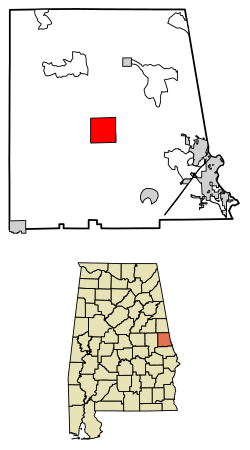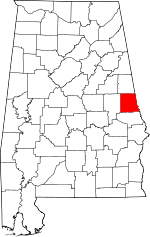LaFayette, Alabama
LaFayette (/ləˈfeɪ.ɛt, -ˈfaɪ-/ lə-F(A)Y-et, /ˈlʌfeɪ.ɛt/ LUF-ay-et) is the county seat of Chambers County, Alabama, United States, 47 miles (76 km) northwest of Columbus, Georgia. As of the 2010 census, the population of the city was 3,003.[5]
LaFayette | |
|---|---|
City | |
The Chambers County Courthouse Square in LaFayette. | |
 Location of La Fayette in Chambers County, Alabama. | |
| Coordinates: 32°53′54″N 85°24′2″W | |
| Country | United States |
| State | Alabama |
| County | Chambers |
| Incorporated | January 7, 1835 |
| Named for | Marquis de Lafayette [1] |
| Government | |
| • Mayor | Barry Moody[2] |
| Area | |
| • Total | 8.88 sq mi (23.01 km2) |
| • Land | 8.86 sq mi (22.94 km2) |
| • Water | 0.03 sq mi (0.07 km2) |
| Elevation | 843 ft (257 m) |
| Population (2010) | |
| • Total | 3,003 |
| • Estimate (2019)[4] | 2,910 |
| • Density | 328.55/sq mi (126.85/km2) |
| Time zone | UTC−6 (CST) |
| • Summer (DST) | UTC−5 (CDT) |
| ZIP code | 36862 |
| Area code | 334 |
| FIPS code | 01-40672 |
| GNIS feature ID | 0164071 |
| Website | cityoflafayetteal |
History
Chambers County was formed in 1832. The newly elected county officials opted to locate the county seat as near as possible to the center of the county. Lots for the new town were auctioned in October 1833, with proceeds from the sale financing the construction of a courthouse and jail. The town was first called "Chambersville", but by the time of incorporation on January 7, 1835, the town name had been changed to "Lafayette", named after the Marquis de Lafayette; its spelling was changed to "LaFayette" due to the influence of newspaper editor Johnson J. Hooper, who created a fictional character called Captain Simon Suggs, a backwoods southerner who pronounced the town's name as "La Fait".[1][6] The city's newspaper, The LaFayette Sun, was founded under the name The Alabama Standard in April 1841 and adopted its current name on August 3, 1881.[7]
In 1898 John Anderson, a black man, was quickly hanged in LaFayette by a mob for a murder he did not commit.[8]
Scenes from the movie Mississippi Burning were filmed at the Chambers County Courthouse and in downtown LaFayette.[1]
LaFayette is the birthplace of heavyweight boxing champion Joe Louis. An 8-foot (2.4 m) bronze statue, executed by sculptor Casey Downing Jr. of Mobile, Alabama, was erected in Louis' honor in front of the Chambers County courthouse.[9] It is also the hometown of Hoyt L. Sherman, one of artist Roy Lichtenstein's principal art professor/mentors at Ohio State University.
Geography
LaFayette is located at 32°53'54.859" North, 85°24'2.822" West (32.898572, -85.400784).[10] According to the U.S. Census Bureau, the city has a total area of 8.9 square miles (23.0 km2), of which 0.027 square miles (0.07 km2), or 0.31%, is water.[5]
Demographics
| Historical population | |||
|---|---|---|---|
| Census | Pop. | %± | |
| 1860 | 1,113 | — | |
| 1870 | 1,382 | 24.2% | |
| 1880 | 1,061 | −23.2% | |
| 1890 | 1,369 | 29.0% | |
| 1900 | 1,629 | 19.0% | |
| 1910 | 1,632 | 0.2% | |
| 1920 | 1,911 | 17.1% | |
| 1930 | 2,119 | 10.9% | |
| 1940 | 2,138 | 0.9% | |
| 1950 | 2,353 | 10.1% | |
| 1960 | 2,605 | 10.7% | |
| 1970 | 3,530 | 35.5% | |
| 1980 | 3,647 | 3.3% | |
| 1990 | 3,151 | −13.6% | |
| 2000 | 3,234 | 2.6% | |
| 2010 | 3,003 | −7.1% | |
| Est. 2019 | 2,910 | [4] | −3.1% |
| U.S. Decennial Census[11] 2013 Estimate[12] | |||
As of the census[13] of 2010, there were 3,003 people, 1,129 households, and 749 families residing in the city. The population density was 337 inhabitants per square mile (130/km2). There were 1,299 housing units at an average density of 145.9 square miles (378 km2). The racial makeup of the city was 68.8% Black or African American, 29.3% White, 0.1% Native American, 0.4% Asian, 0.8% from other races, and 0.7% from two or more races. 1.9% of the population were Hispanic or Latino of any race.
There were 1,129 households out of which 23.4% had children under the age of 18 living with them, 29.6% were married couples living together, 30.7% had a female householder with no husband present, and 33.7% were non-families. 29.6% of all households were made up of individuals and 13.2% had someone living alone who was 65 years of age or older. The average household size was 2.43 and the average family size was 2.98.
In the city, the age distribution of the population shows 22.0% under the age of 18, 9.8% from 18 to 24, 23.4% from 25 to 44, 26.8% from 45 to 64, and 18.0% who were 65 years of age or older. The median age was 40.2 years. For every 100 females, there were 87.1 males. For every 100 females age 18 and over, there were 103.5 males.
The median income for a household in the city was $26,319, and the median income for a family was $31,629. Males had a median income of $31,842 versus $27,833 for females. The per capita income for the city was $12,149. About 28.5% of families and 36.2% of the population were below the poverty line, including 43.2% of those under age 18 and 22.9% of those age 65 or over.
Education
The Chambers County School District provides public education for LaFayette. Within the city limits are two high schools (Lafayette High School and the Chambers County Career Technical School), one middle school (JP Powell Middle School), and one elementary school (Eastside Elementary School).
Chambers Academy (grades pre-K through 12) is a private school in LaFayette.
Notable people
- William B. Bowling, U.S. Representative from 1920 to 1928
- Dave Butz, former NFL player
- James R. Dowdell, jurist and the 20th Chief Justice of the Alabama Supreme Court from 1909 to 1914
- Morris Finley, professional basketball player. Graduated from LaFayette High School.
- Hal Finney, former Major League Baseball player
- Lou Finney, former Major League Baseball player
- Perry Griggs, former Baltimore Colts player
- James Thomas "Cotton Tom" Heflin, member of the United States House of Representatives and a leading proponent of white supremacy
- Johnson J. Hooper, author and humorist
- Jay Jacobs, athletic director at Auburn University
- Joe Louis, Heavyweight boxing champion
- Leon Renfroe Meadows, president of East Carolina University from 1934 to 1944
- Arthur W. Mitchell, U.S. Representative from Illinois and first African American to be elected to the United States Congress as a Democrat
- Gertrude Morgan, preacher, missionary, artist, musician, and poet who worked in New Orleans in the 1960s and '70s
- Hoyt L. Sherman, art professor and principal mentor to pop artist Roy Lichtenstein
- Jimmy Stewart, former Major League Baseball player. Graduated from LaFayette High School in 1957.
- James Still, poet, novelist, and folklorist
- Mike Williams, former tight end for the Washington Redskins
Gallery
- The Chambers County Courthouse in LaFayette is featured prominently in the 1988 movie Mississippi Burning. Chambers County Courthouse Square Historic District was added to the National Register of Historic Places on March 27, 1980.
- LaFayette City Hall and Police Department.
- LaFayette Post Office (ZIP code:36862)
- LaFayette High School
- The Chambers County Museum is located in the former Central of Georgia railway depot. The depot was built of masonry construction with a tile roof in 1908 after fire destroyed the original wood structure.
 The Ernest McCarty Oliver House was added to the National Register of Historic Places January 21, 1974.
The Ernest McCarty Oliver House was added to the National Register of Historic Places January 21, 1974.- Vines Funeral Home and Ambulance Service was added to the National Register of Historic Places on October 15, 2008.
- Built by early settlers to the area, the LaFayette Presbyterian Church has stood since 1836.
- Downtown LaFayette, Alabama
- Downtown LaFayette, Alabama
- An old theatre in Downtown LaFayette most recently served as a church.
- Statue of Lady Justice which tops the courthouse
- The cornerstone of the courthouse, laid by Masons in 1899.
- Aerial photograph of downtown LaFayette (note courthouse at center of photograph)
References
- Schmidt, Greg. "LaFayette". Encyclopedia of Alabama. Retrieved January 12, 2010.
- "New Council takes office". The LaFayette Sun blog. November 7, 2012. Retrieved January 13, 2013.
- "2019 U.S. Gazetteer Files". United States Census Bureau. Retrieved June 29, 2020.
- "Population and Housing Unit Estimates". United States Census Bureau. May 24, 2020. Retrieved May 27, 2020.
- "Geographic Identifiers: 2010 Demographic Profile Data (G001): La Fayette city, Alabama". U.S. Census Bureau, American Factfinder. Archived from the original on February 12, 2020. Retrieved June 2, 2014.
- "Spell it with a capital 'F'". The LaFayette Sun blog. January 2, 2013. Retrieved January 13, 2013.
- "A History of The LaFayette Sun". The LaFayette Sun. August 22, 2012. Retrieved January 13, 2013.
- "May Have Hanged Wrong Man". Retrieved 16 December 2017.
- Craft, Chris (27 February 2010). "Joe Louis statue unveiled today will honor an icon". Ledger-Enquirer. Columbus, Georgia: McClatchy Company. Archived from the original on 22 February 2012. Retrieved 10 March 2010.
- "US Gazetteer files: 2010, 2000, and 1990". United States Census Bureau. 2011-02-12. Retrieved 2011-04-23.
- "U.S. Decennial Census". Census.gov. Retrieved June 6, 2013.
- "Annual Estimates of the Resident Population: April 1, 2010 to July 1, 2013". Archived from the original on May 22, 2014. Retrieved June 3, 2014.
- "U.S. Census website". United States Census Bureau. Retrieved 2015-07-10.
